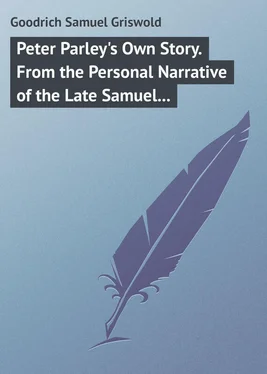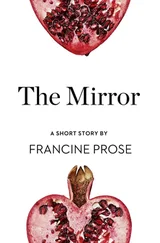Samuel Goodrich - Peter Parley's Own Story. From the Personal Narrative of the Late Samuel G. Goodrich, («Peter Parley»)
Здесь есть возможность читать онлайн «Samuel Goodrich - Peter Parley's Own Story. From the Personal Narrative of the Late Samuel G. Goodrich, («Peter Parley»)» — ознакомительный отрывок электронной книги совершенно бесплатно, а после прочтения отрывка купить полную версию. В некоторых случаях можно слушать аудио, скачать через торрент в формате fb2 и присутствует краткое содержание. Издательство: Иностранный паблик, Жанр: foreign_language, foreign_prose, на английском языке. Описание произведения, (предисловие) а так же отзывы посетителей доступны на портале библиотеки ЛибКат.
- Название:Peter Parley's Own Story. From the Personal Narrative of the Late Samuel G. Goodrich, («Peter Parley»)
- Автор:
- Издательство:Иностранный паблик
- Жанр:
- Год:неизвестен
- ISBN:нет данных
- Рейтинг книги:5 / 5. Голосов: 1
-
Избранное:Добавить в избранное
- Отзывы:
-
Ваша оценка:
- 100
- 1
- 2
- 3
- 4
- 5
Peter Parley's Own Story. From the Personal Narrative of the Late Samuel G. Goodrich, («Peter Parley»): краткое содержание, описание и аннотация
Предлагаем к чтению аннотацию, описание, краткое содержание или предисловие (зависит от того, что написал сам автор книги «Peter Parley's Own Story. From the Personal Narrative of the Late Samuel G. Goodrich, («Peter Parley»)»). Если вы не нашли необходимую информацию о книге — напишите в комментариях, мы постараемся отыскать её.
Peter Parley's Own Story. From the Personal Narrative of the Late Samuel G. Goodrich, («Peter Parley») — читать онлайн ознакомительный отрывок
Ниже представлен текст книги, разбитый по страницам. Система сохранения места последней прочитанной страницы, позволяет с удобством читать онлайн бесплатно книгу «Peter Parley's Own Story. From the Personal Narrative of the Late Samuel G. Goodrich, («Peter Parley»)», без необходимости каждый раз заново искать на чём Вы остановились. Поставьте закладку, и сможете в любой момент перейти на страницу, на которой закончили чтение.
Интервал:
Закладка:
This personage, whom I shall have occasion again to introduce to my readers, was, in my time, a justice of the peace, town librarian, and general oracle in such loose matters as geography, history, and law; then about as uncertain and unsettled in Ridgefield, as is now the longitude of Lilliput. He had a long, lean face; long, lank, silvery hair; and an unctuous, whining voice. With these advantages, he spoke with the authority of a seer, and especially in all things relating to the revolutionary war.
The agitating scenes of that event, so really great in itself, so unspeakably important to the country, had transpired some five-and-twenty years before. The existing generation of middle age had all witnessed it; nearly all had shared in its vicissitudes. On every hand there were corporals, serjeants, lieutenants, captains, and colonels, no strutting fops in militia buckram, raw blue and buff, all fuss and feathers, but soldiers, men who had seen service and won laurels in the tented field. Every old man, every old woman, had stories to tell, radiant with the vivid realities of personal observation or experience. Some had seen Washington, and some Old Put; one was at the capture of Ticonderoga under Ethan Allen; another was at Bennington, and actually heard old Stark say, "Victory this day, or my wife Molly is a widow!" Some were at the taking of Stony Point, and others in the sanguinary struggle of Monmouth. One had witnessed the execution of André, and another had been present at the capture of Burgoyne. The time which had elapsed since these events had served only to magnify and glorify these scenes, as well as the actors, especially in the imagination of the rising generation. If perchance we could now dig up and galvanize into life a contemporary of Julius Cæsar, who was present and saw him cross the Rubicon, and could tell us how he looked and what he said, we should listen with somewhat of the greedy wonder with which the boys of Ridgefield listened to Lieutenant Smith, when of a Saturday afternoon, seated on the stoop of Keeler's tavern, he discoursed upon the discovery of America by Columbus, Braddock's defeat, and the old French war; the latter a real epic, embellished with romantic episodes of Indian massacres and captivities. When he came to the Revolution, and spoke of the fight at Ridgefield, and punctuated his discourse with a present cannon-ball, sunk six inches deep in a corner-post of the very house in which we sat, you may well believe it was something more than words – it was, indeed, "action, action, glorious action!" How little can people now-a-days comprehend or appreciate these things!
CHAPTER II
THE NEW HOUSE – HIGH RIDGE – NATHAN KELLOGG'S SPY-GLASS – THE SHOVEL – THE BLACK PATCH IN THE ROAD – DISTRUST OF BRITISH INFLUENCE – OLD CHICH-ES-TER – AUNT DELIGHT – RETURN AFTER TWENTY YEARS.
My memory goes distinctly back to the year 1797, when I was four years old. At that time a great event happened – great in the narrow horizon of childhood: we removed from the Old House to the New House! This latter, situated on a road tending westward and branching from the main street, my father had just built; and it then appeared to me quite a stately mansion and very beautiful, inasmuch as it was painted red behind and white in front: most of the dwellings thereabouts being of the dun complexion which pine-boards and chestnut-shingles assume, from exposure to the weather. Long after, having been absent twenty years, I revisited this my early home, and found it shrunk into a very small and ordinary two-story dwelling, wholly divested of its paint, and scarcely thirty feet square.
This building, apart from all other dwellings, was situated on what is called High Ridge, a long hill, looking down upon the village, and commanding an extensive view of the surrounding country. From our upper windows, this was at once beautiful and diversified. On the south, as I have said, the hills sloped in a sea of undulations down to Long Island Sound, a distance of some fourteen miles. This beautiful sheet of water, like a strip of pale sky, with the island itself, more deeply tinted, beyond, was visible in fair weather, for a stretch of sixty miles, to the naked eye. The vessels, even the smaller ones, sloops, schooners, and fishing-craft, could be seen, creeping like insects over the surface. With a spy-glass – and my father had one bequeathed to him by Nathan Kellogg, a sailor, who made rather a rough voyage of life, but anchored at last in the bosom of the Church, as this bequest intimates – we could see the masts, sails, and rigging. It was a poor, dim affair, compared with modern instruments of the kind; but to me, its revelations of an element which then seemed as beautiful, as remote, and as mystical as the heavens, surpassed the wonders of the firmament.
To the west, at a distance of three miles, lay the undulating ridge of hills, cliffs, and precipices already mentioned, and which bear the name of West Mountain. They are some five hundred feet in height, and from our point of view had an imposing appearance. Beyond them, in the far distance, glimmered the peaks of the highlands along the Hudson. These two prominent features of the spreading landscape – the sea and the mountain, ever present, yet ever remote – impressed themselves on my young imagination with all the enchantment which distance lends to the view. I have never lost my first love. Never, even now, do I catch a glimpse of either of these two rivals of nature, such as I first learned them by heart, but I feel a gush of emotion as if I had suddenly met with the cherished companions of my childhood. In after days, even the purple velvet of the Apennines and the poetic azure of the Mediterranean, have derived additional beauty to my imagination from mingling with these vivid associations of my childhood.
It was to the New House, then, thus situated, that we removed, as I have stated, when I was four years old. On that great occasion, everything available for draught or burden was put in requisition; and I was permitted, or required, I forget which, to carry the peel , as it was then called, but which would now bear the title of "shovel." Birmingham had not then been heard of in those parts, or at least was a great way off; so this particular utensil had been forged expressly for my father by David Olmstead, the blacksmith, as was the custom in those days. I recollect it well, and can state that it was a sturdy piece of iron, the handle being four feet long, with a knob at the end. As I carried it along, I doubtless felt a touch of that consciousness of power which must have filled the breast of Samson as he bore off the gates of Gaza. I recollect perfectly well to have perspired under the operation, for the distance of our migration was half-a-mile, and the season was summer.
One thing more I remember: I was barefoot; and as we went up the lane which diverged from the main road to the house, we passed over a patch of earth blackened by cinders, where my feet were hurt by pieces of melted glass and metal. I inquired what this meant, and was told that here a house was burned down by the British troops already mentioned, and then in full retreat, as a signal to the ships that awaited them in the Sound, where they had landed, and where they intended to embark.
This detail may seem trifling; but it is not without significance. It was the custom in those days for boys to go barefoot in the mild season. I recollect few things in life more delightful than, in the spring, to cast away my shoes and stockings, and have a glorious scamper over the fields. Many a time, contrary to the express injunctions of my mother, have I stolen this bliss; and many a time have I been punished by a severe cold for my disobedience. Yet the bliss then seemed a compensation for the retribution. In these exercises I felt as if stepping on air; as if leaping aloft on wings. I was so impressed with the exultant emotions thus experienced, that I repeated them a thousand times in happy dreams; especially in my younger days. Even now these visions sometimes come to me in sleep, though with a lurking consciousness that they are but a mockery of the past; sad monitors of the change which time has wrought upon me.
Читать дальшеИнтервал:
Закладка:
Похожие книги на «Peter Parley's Own Story. From the Personal Narrative of the Late Samuel G. Goodrich, («Peter Parley»)»
Представляем Вашему вниманию похожие книги на «Peter Parley's Own Story. From the Personal Narrative of the Late Samuel G. Goodrich, («Peter Parley»)» списком для выбора. Мы отобрали схожую по названию и смыслу литературу в надежде предоставить читателям больше вариантов отыскать новые, интересные, ещё непрочитанные произведения.
Обсуждение, отзывы о книге «Peter Parley's Own Story. From the Personal Narrative of the Late Samuel G. Goodrich, («Peter Parley»)» и просто собственные мнения читателей. Оставьте ваши комментарии, напишите, что Вы думаете о произведении, его смысле или главных героях. Укажите что конкретно понравилось, а что нет, и почему Вы так считаете.












